It is that time of the year again, when vibrant festivities fill the air! From Ganesh Chaturthi to Dussehra, from Diwali to Chhath Pooja, these festivals hold immense significance in every Indian household. In a manner akin to the concept of swachhata, festivals have played a pivotal role in instigating behavioral transformations and lifestyle changes. India is also host to numerous festivals that advocate for sustainable practices in order to maintain harmony with the environment. Whether it is through the use of eco-friendly idols or the construction of bamboo pandals, cities are making additional efforts to embrace the principles of RRR - Reduce, Reuse, and Recycle. By organizing zero-waste festivities and promoting plastic-free celebrations, these initiatives demonstrate a steadfast commitment to sustainable practices. Clean Green festivals prioritize environmental sustainability and responsibility. These festivals aim to minimize their carbon footprint and reduce waste by implementing eco-friendly practices such as composting, recycling, and using renewable energy sources. Additionally, they promote environmental awareness and education through workshops, exhibits, and interactive activities. By prioritizing sustainability, Clean Green Festivals serve as a model for other events.
The celebration of Ganesh Chaturthi in Maharashtra this year was characterized by a shift towards sustainable alternatives. This included the use of bamboo for pandals, eco-friendly clay or plantable idols for Ganesh, flower rangolis, and the creation of man-made immersion sites for eco-friendly visarjan.
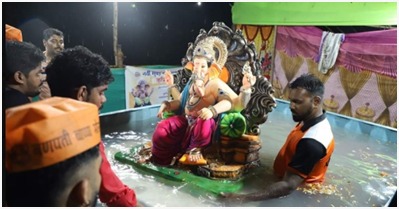
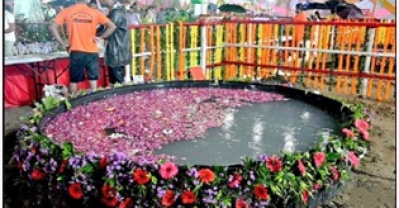
As part of the recently concluded Swachhata Pakhwada- Swachhata Hi Seva 2023, an inter school competition was organized in Thane for Eco-Friendly Ganpati Idol Making and Best made out of Waste. More than 22,000 students actively participated in this competition, creating Ganpati idols using eco-friendly materials and raising awareness about sustainability. To support the ‘Green Ganesh Chaturthi’, many celebrities and popular stars also made clay Ganesh idols at home.
Panvel MC’s commitment extended to providing 96 Ganesh Idol Donation Centers. These centers enabled residents to donate their Ganesh idols for eco-conscious Visarjan, reinforcing the idea of recycling and sustainable practices during the festival. PMC's innovative approach was evident in deploying specially designed pontoon boats (Tarafa) at 56 natural ponds, ensuring that the Visarjan process is as eco-friendly as possible.

After the conclusion of the Ganesh visarjan ceremony, the residents of Mumbai came together in a collective effort to organize cleanliness drives in different locations. Bollywood celebs, college students, and dedicated volunteers actively participated in the removal of debris and pollution resulting from the immersion of idols at Juhu Beach. Over 900 swachh volunteers, including more than 500 students from various schools in Mumbai, took charge of Versova Beach and successfully cleaned up a substantial 80,000 kilograms of waste. Additionally, they diligently collected approximately 7,400 Ganesh idols crafted from Plaster of Paris, which had the potential to further contaminate the beach environment.

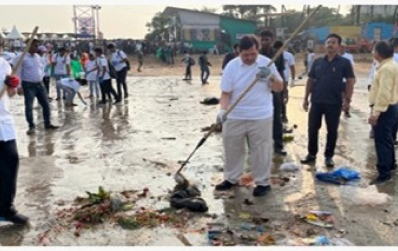
To steer away from the environmental impact of plastic in these celebrations, many States are now embracing sustainable solutions. In alignment with this eco-conscious approach, Assam chose to celebrate Ganesh Puja with pandals crafted with bamboo, showcasing a commitment to both tradition and environmental responsibility. The Digboi Municipal Board orchestrated a remarkable celebration of plastic-free Ganesh Puja. At this event, bamboo took center stage in the crafting of idols, the construction of the entrance gate, and the elaborate traditional decorations, such as the iconic Japi headgear and Khorahi baskets. This ingenious use of bamboo embodied the spirit of sustainability. Delhi’s Ganesh Chaturthi celebration involved, distribution of eco-friendly Ganesha. The idols carried within them plantable seeds. Crafted from coconut bark and clay, these figures once immersed dissolved into the soil, enabling the enclosed seed to sprout into a plant over time.
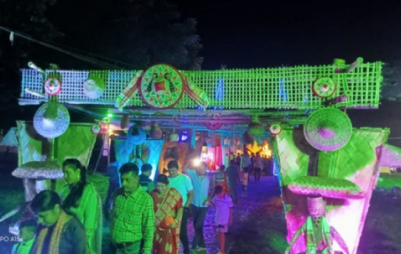
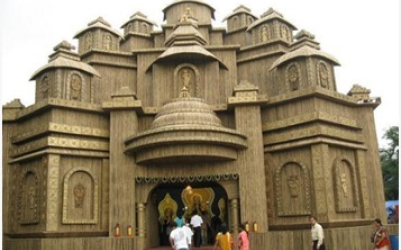
As the country gears up for Dussehra and Durga Puja, preparations are in full swing and special emphasis is being laid on going green, not just in West Bengal but other parts of the country. Dussehra is seeing a digital transformation with laser shows or going for effigies made of recyclable paper or plastic. Rather than decking up the pandals with piles of thermocol and plastic products, organisers are now using alternatives such as bamboo, wooden planks, coconut shell, cloth, jute or coir ropes, hay/straw, cane or paper and soluble clay Durga idols are being made.
To make the events garbage & SUP free, blue & green dustbins are being placed at high footfall areas, night cleanliness drives are being regularly conducted and banners and other decorations are being made of non-plastic objects. Some pandals in Delhi will be using only bamboo and cotton in the installation of pandal. Most of the immersion sites have already got man-made tanks and ponds in place. The leftover materials such as flowers and other organic products collected from the puja will be reused to produce compost for the garden or recycled for other purposes. Use of paper plates, banana leaves, shell leaves or clay plates for serving the prasad and refreshments at the food stalls has been arranged. During the Navaratri, Uttar Pradesh plans to collaborate with market association, Sculpture makers, local vendors, temple association/ religious leaders and community groups to prepare Idols from clay or any eco friendly material which can decompose easily in water also ensure zero waste swacchotsav. For 8th or 9th day of Navaratri, UP plans to set up Arpan Sthal for idols and Arpan Kalash along the Ghats to collect offerings.
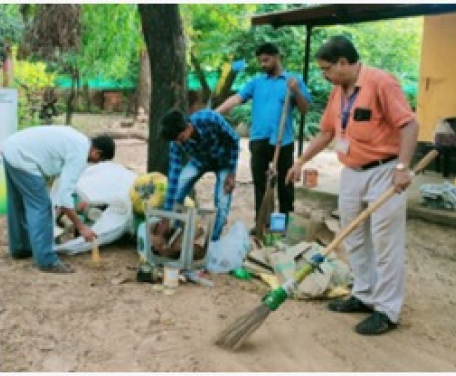
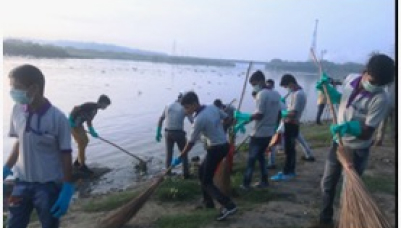
During the Chhath Puja, Patna Municipal Corporation organizes zero waste Chhath Puja at each of its Chhath Ghat. Separate dustbins are installed, separate vehicles are designated to collect the holy waste from the ghats. The wet waste collected is converted into organic compost. Plastic ban is ensured and zero waste branding is extensively done. A comprehensive Information, Education, and Communication (IEC) campaign is conducted for an entire month leading up to the Puja, with the aim of fostering a cleaner and more hygienic environment during this auspicious occasion.
As urban India moves towards a sustainable future, eco-friendly festivals serve as a catalyst for a safer and cleaner environment. The festivities not only showcase behavioral changes, but a shift towards eco-friendly, garbage free, single-use plastic free events and celebrations. It's time to celebrate Parv Swachhata Ka!
WEBSITE: https://sbmurban.org/
FACEBOOK: Swachh Bharat Mission - Urban | TWITTER: @SwachhBharatGov
INSTAGRAM:sbm_urban | YOUTUBE: Swachh Bharat Urban | LINKEDIN: swachh-bharat-urban